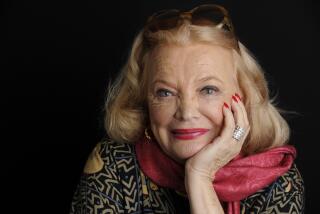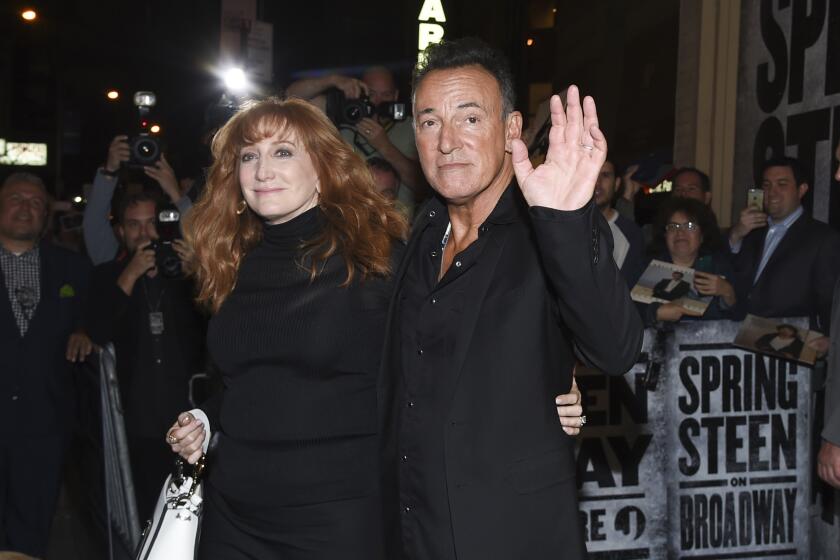The Real Cassavetes Comes Through : Films: A collection of his movies, which he linked to his individual vision, is at a Santa Ana theater. Among the works are ‘Faces’ and ‘Opening Night.’
John Cassavetes the director was much like John Cassavetes the actor.
In performances that were raw and street-edged, even when he was trying to be nice, there was the sense that something was going on inside, an inner dialogue both passionate and messy.
Cassavetes imprinted his better movies with the same qualities: They are tightly wound and sloppy, honest and defiantly artless. The best ones, some of which are at the center of a Cassavetes’ collection screening through July 25 at the South Coast Village Edwards theater in Santa Ana, are as affecting in a vaguely confrontational way as he was as an actor, and just as personal.
Most people probably know Cassavetes as one of the stars of box office winners such as “Rosemary’s Baby” and “The Dirty Dozen.” But to him, acting was a means to end--the money he made performing was used to finance his films, which he usually wrote, directed and often starred in.
He was an auteur, a maverick who avoided the major studios and their control. He chose instead to make movies linked to his individual vision, no matter how out-of-the-mainstream and non-commercial it might be. Cassavetes even distributed most of the films himself, not always reaching a wide audience outside the art houses.
Still, he’s always generated interest. His work has been noisily panned, and just as loudly praised. Along the way, Cassavetes’ talents have been recognized in traditional ways; he was nominated for three Academy Awards, for writing, directing and acting.
As with other movie makers who consciously choose to stay near the fringe, Cassavetes, who died in 1989, developed a fan following of cultish proportions. One of the favorites, probably because of its peculiar mix of low-life bravura and cockeyed technique, is “The Killing of a Chinese Bookie,” playing today through Thursday.
This problematic film is an acquired taste, but it does capture the Cassavetes style. Featuring Ben Gazzara, Cassavetes’ longtime friend and one of his regular ensemble actors, as a strip joint owner forced into a murder to ease a gambling debt, “Chinese Bookie” (released in 1976) is a series of typically improvised, slowly advancing scenes.
There are patches when “Chinese Bookie” has power, especially when Gazzara’s character reveals how lost he is in the gray areas between right and wrong, but overall it betrays a lack of control. Cassavetes’ reliance on the hand-held camera, seemingly spontaneous dialogue to give an aura of immediacy, and long, probing scenes can be affecting in his other movies, but here it veers into self-indulgence and complacency.
There may be traces of self-indulgence in “Faces,” screening Friday through July 11, but you can’t accuse this 1968 release of complacency. Emotional alienation is at the core of Cassavetes’ movies, and that’s true for “Faces,” his hard-nosed-but-comic look at an affluent middle-aged couple living in suburban Los Angeles.
The plot is bare and a little cliched, but the film’s dramatic scenes, usually shot with a roving camera and lighted in fairly crude ways, are realistically, almost voyeuristicly, staged. The film follows Richard (John Marley) and Maria (Lynn Carlin) as their marriage starts to dissolve and they look for diversions, Richard with a hooker played by Gena Rowlands (Cassavetes’ wife) and Maria with an aging surfer-gigolo (Seymour Cassel).
Cassavetes received a screenwriting Academy Award nomination for “Faces,” and he considered it a high-water mark in his career. As a link in his cinematic experience, it paved the way for perhaps his most popular movie, “A Woman Under the Influence,” which came out six years later and more closely looked at the frustrations at the core of traditional lifestyles.
On July 12, the series will offer “Shadows,” Cassavetes’ 1961 debut that was hailed as a masterpiece, the kind of career-starter that critics described with words such as influential and revolutionary. Shot in 16 m.m., it’s a primitive but emotionally galvanizing film that puts his naturalistic, improvisational style to good use.
Cassavetes’ goal in “Shadows” was to capture the bright neon and shabby darkness of Manhattan, and the lives of a few New Yorkers as they roam through it. He loosely weaves together the stories of three characters: a young black girl, in love with a white boy; the girl’s older brother, a jazz singer, whose accidental meeting with his sister’s beau leads to the couple’s breakup; and the girl’s younger brother, a would-be jazz trumpeter who spends his time bumming around, picking up girls and getting into fights.
The retrospective closes July 19 with “Opening Night,” made in 1977 and shown at the New York Film Festival in 1988 but only now receiving a general release in American theaters. This disturbingly honest, sometimes annoyingly invasive film (Cassavetes close-ups can have a brutal frankness) is organized around Gena Rowland’s intense performance as an actress suffering the awareness of lost youth while rehearsing a play about an aging woman.
The John Cassavetes collection will be shown at the South Coast Village Edwards theater near the corner of Bristol Street and Sunflower Avenue in Santa Ana through July 25. “The Killing of a Chinese Bookie” will screen daily through Thursday; “Faces” July 5-11; “Shadows” July 12-18; and “Opening Night” July 19-25. Call the theater, (714) 540-0594, for times. Tickets: $3.50 and $6.
More to Read
Only good movies
Get the Indie Focus newsletter, Mark Olsen's weekly guide to the world of cinema.
You may occasionally receive promotional content from the Los Angeles Times.










